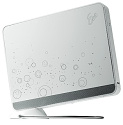Asus nettop gets discrete graphics
Dec 3, 2008 — by LinuxDevices Staff — from the LinuxDevices Archive — 4 views Asus has announced enhanced versions of its Eee Box “nettop” computer. Targeting home-theater applications, the B204 and B206 include HDMI outputs, as well as discrete graphics circuitry from ATI, and could prove popular for Linux media center distributions like Boxee, MythTV, SageTV, Linux MCE, and… others.
Asus has announced enhanced versions of its Eee Box “nettop” computer. Targeting home-theater applications, the B204 and B206 include HDMI outputs, as well as discrete graphics circuitry from ATI, and could prove popular for Linux media center distributions like Boxee, MythTV, SageTV, Linux MCE, and… others.
(Click here for a larger view of Asus's Eee Box B204)
Asus released the original compact Eee Box last year, for Windows only, and the manufacturer does not mention Linux support for either the new or old models. However, being typical x86 boxes, both the original and the new home-theater nettops should run Linux without a problem.
In fact, the B204/B206 may be a perfect fit for the similarly named Boxee distro, currently being test-marketed. Billed as the first “social” media center distribution, Boxee software enables PCs and other devices to serve as unified gateways to a range of social and media networking services. Users can play and share media from computers and other devices across a home network, stream content from various free and commercial Internet sources, or download videos, music, and photos from the Internet, says Boxee. Based on the XMBC Media Center open-source project, Boxee is currently in alpha stage on Ubuntu Linux and Mac OS X platforms. It has been recently ported to the Apple TV 2.3, and a Windows version is said to be in the works, says a Boxee blog.
Inside the Eee Box
Both the old and new Eee Box models manage to fit typical netbook ingredients into a stay-at-home box, including Intel's 1.6GHz, 45nm Atom N270, along with the chipmaker's 945GCSE and 82801GBM (ICH7) supporting chips. The Eee Box's mobile-oriented components use less power than the Atom 230, 82945GC, and 82801GB found on many other nettops, and on Intel's own D945GCLF mini-ITX motherboard.
Asus claims the Eee Box consumes only around 20 Watts of power, allowing those who leave their computers on 24/7 to save approximately $160 on their yearly electricity bill. But, while reviewers generally lauded initial versions of the device, they criticized its inability to play HD video at resolutions greater than 720p (1280 x 720 pixels).
The new Eee Box B204 and B206 aim to lick the HD problem via inclusion of discrete graphics circuitry and dedicated video memory. According to the company, the devices now include ATI's Radeon HD 3400 GPU (graphics processor unit), equipped with 256MB of DDR2 RAM, and claimed — by ATI, at least — to support 1080p (1920 x 1280 pixels). The new Eee Boxes also sport HDMI ports, for direct A/V connection to HD television sets.
In addition, where the first Eee Boxes had 80GB HDDs (hard disk drives), the B204 and B206 feature 160GB, 5400rpm drives. Asus says its new babies also include 1GB of RAM, 802.11b/g/n wireless networking, gigabit Ethernet ports, SD/SDHC/MMC/Memory Stick/Memory Stick Pro card readers, and four USB ports. A 3.5mm headphone jack doubles as an S/PDIF optical digital output, courtesy of a supplied adapter.
The Eee Box B204 is slightly enhanced, compared to the B206 base model, via the former's inclusion of Bluetooth. The B204 also includes an internal battery, said to act as a UPS (uninterruptible power supply) that keeps the device running “for a period of time” when power is lost.
Unheralded by Asus, but presumably carried over from the original Eee Box, is a ROM that includes Express Gate, a cut-down version of Linux that reportedly allows users who are in a hurry to bypass Windows, loading the Firefox web browser, Adobe Flash, Skype, and a photo viewer “within a few seconds.” A variant of DeviceVM's Splashtop technology, Express Gate has been featured on a variety of Asus motherboards and computers, including the all-in-one, Linux-ready Eee Top and the N10 netbook.
Finally, the Eee Box B204 and B206 are supplied with a remote control, “stylish” stand, and external 36 Watt power adapter, Asus says.
Features and specifications released by Asus for the Eee Box B204 and B206:
- Processor — 1.6GHz Atom N270
- Memory — 1GB of DDR2 RAM (potential expansion not cited)
- Storage — 160GB HDD (SATA II, 5400rpm)
- Graphics — ATI Radeon HD 3400, with 256MB of RAM, and HDMI output
- Networking:
- LAN — Gigabit Ethernet
- WLAN — 802.11b/g/n
- PAN — Bluetooth (B204 only)
- LAN — Gigabit Ethernet
- Other I/O:
- 4 x USB 2.0
- HDMI (also supports DVI-D via adapter)
- 3.5mm jack for analog audio output (provides S/PDIF optical digital output via adapter)
- 4 x USB 2.0
- Expansion — SD/SDHC/MMC/MS/MS Pro card reader
- Dimensions — n/s, but original Eee Box measures 8.77 x 7 x 1 inches (223 x 178 x 26mm) without stand
- Weight — n/s, but original Eee Box weighs 2.2 pounds
Asus did not release pricing or availability information for the Eee Box B204 or B206.
A detailed review of the original Eee Box is available on the SilentPCReview.com website, here.
This article was originally published on LinuxDevices.com and has been donated to the open source community by QuinStreet Inc. Please visit LinuxToday.com for up-to-date news and articles about Linux and open source.